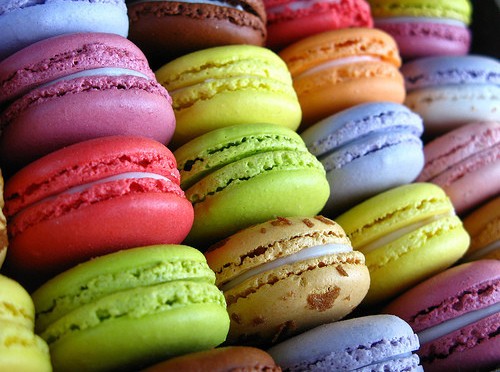So yea, the title was a bit misleading. I know all of you were really hoping that I secretly got married and was going to spill some sagacious advice on marriage, but unfortunately, that is not the case … I’m hoping to shed a little light on animal husbandry, something that I’ve started thinking about more and more ever since my love for cooking really blew up. While we traditionally think of cooking as all the actions that happen after you’ve obtained your meat/vegetable/other food product, such a mindset is incomplete (I’ve definitely had this mindset for the majority of my life). The restaurant industry is quite ahead in this area; there’s a strong understanding that food which is treated with respect in both the pre- and actual-cooking process, it just plain tastes better. Many restaurants build strong relationships with local farms and chefs are actually out there to see and understand how the animals/plants are raised with care. Unfortunately, when it comes to the average home cook, we can’t always do this, and the animal husbandry industry can take advantage of this through factory farming/industrial agriculture that produces cruel conditions to the animals.
“Whoever is righteous has regard for the life of his beast, but the mercy of the wicked is cruel.” (Proverbs 12:10)
Look at the birds of the air: they neither sow nor reap nor gather into barns, and yet your heavenly Father feeds them. Are you not of more value than they? (Matthew 6:26)
Avoiding and preventing animal cruelty seems like a pretty normal Christian thing to support. I mean … even without the verses above or considering the Genesis dominion verse (Genesis 1: 26) and what dominion means, it seems like the “right” thing to do. Preventing the unnecessary suffering of a living being just seems like something that most people can get on board with. So given this pretty reasonable stance and, on top of that, a clear call from God to take care of the animals on this earth, is there anything we can do? I mean after all, most of us aren’t in the animal husbandry industry. Surprise surprise, my answer to the question is “yes!” But I’m not going to go into that for this post. It will probably come up when I do a post on some of the intersections of food and economics. For this post, I want to just share some reflections on a particular case of (potential) animal cruelty.
“All things are lawful for me,” but not all things are helpful. “All things are lawful for me,” but I will not be dominated by anything. “Food is meant for the stomach and the stomach for food”—and God will destroy both one and the other. (1 Corinthians 6:12-13a)
A few weeks ago, the ban on foie gras in California was lifted. For those who don’t know, foie gras is the liver of a duck or goose.[1] While I’ve never had it (I did get to touch it once when I was externing at the restaurant), foie gras is, to many, the Holy Grail of fine cuisine. Perhaps the best analogy to think about is that bacon could be considered the “layman’s foie gras?” It’s rich, fatty, buttery taste/texture goes deliciously with just about anything. Anyways, such a description probably doesn’t even do it justice.
So if such a food is so delicious, why would there be a ban on it? A quick search will yield countless results. The main controversy behind foie gras is that its production relies on the force-feeding of the goose until its liver has become severely bloated. What this process, also known as “gavage,” looks like in practice is as follows, several times each day the geese are gathered and a long metal or plastic tube is shoved down each goose’s neck and then food is pumped straight into the goose’s liver. Watching this process can certainly be discomforting, and on top of the discomfort the geese must feel during the force-feeding process, there are other bodily discomforts that they also face because they are artificially bloated.
Many aviary experts, however, argue that gavage actually doesn’t produce additional harm to the geese for two reasons. 1) Geese have a different type of neck/esophagus that was naturally built to handle swallowing large objects whole, and 2) fowl naturally store a lot of fat and being fed such large quantities of food doesn’t cause extreme discomfort. While I’ve never been to a foie gras farm, based on some of the videos I’ve seen and accounts I’ve read, at least at the better foie gras farms, it doesn’t seem like the geese are harmed in any way worse than what you would traditionally see on farms for other animals.
“But God chose what is foolish in the world to shame the wise; God chose what is weak in the world to shame the strong” (1 Corinthians 1: 27)
Conventional wisdom says that this force-feeding is necessary for foie gras production because otherwise, farmed geese would not have such an enlarged liver that was as fatty and buttery and delectable. But is such force-feeding really necessary? I was recently introduced to a “this American Life” segment on natural foie gras that was being raised in Spain by a man named Eduardo Sousa. The segment can be found here and a similar Ted Talk here, both with chef Dan Barber explaining his experience going to this farm and what he saw. (I do highly recommend listening to either of these whenever you have some down time or on your next commute to work. It’s just a very fascinating story.)
At this farm, which Eduardo believe is the only completely natural foie gras farm in the world, Eduardo’s philosophy is to let his geese live as naturally as possible, to the point that are even free to just leave. The fences are built in a way such that there is only an electrical current on the outside, so as to protect the geese from predators. There is absolutely no force-feeding; the food is simply all available naturally throughout the hundreds of acres of farm space. When asked how the geese can have such large livers Eduardo explains that geese have a natural inclination to find abundance of food and generate reserves of fat. Normal domesticated geese sense that they are in their master’s control and will not freely eat. By creating an environment that is so free and abundant with food, Eduardo’s geese will fulfill their natural desires to gorge on the food. Additionally (and I am shocked by this), when wild geese fly south, Eduardo’s geese will call these wild geese to come down and enjoy the abundance of food on the farm. These wild geese willingly come onto the farm, mate with the domesticated geese, and even stay!
Naturally, such an unorthodox way of raising foie gras does incur a cost. Just to name a few of these: the land-to-geese ratio is much higher than the average geese farm, meaning higher costs for fewer geese; the geese are free to leave if they choose to do so; even when the geese gorge on the available food, their livers still won’t reach the largest sizes that force-feeding can produce.
“Give me now wisdom and knowledge to go out and come in before this people, for who can govern this people of yours, which is so great?” (2 Chronicles 1:10)
“His master said to him, ‘Well done, good and faithful servant. You have been faithful over a little; I will set you over much. Enter into the joy of your master.’” (Matthew 25:21)
Every time I think about the topic of foie gras, I feel extremely conflicted. I can get on board with the arguments that aviary experts make about gavage not being cruel, so long as the other farming conditions are acceptable. And yet, the act of force-feeding is just not natural and must be inferior to an option that allows the geese to naturally grow and experience life. Additionally, this action is for a food that’s considered a luxury, not an everyday food. … I really don’t know when it comes to this specific topic. It seems … passable, but nowhere near optimal …
What’s fascinating as I hear about Eduardo’s natural foie gras, though, is just how much there is an understanding that everything he produces comes from God. Two things comes to mind, first, in response to the fact that Eduardo loses out on foie gras production by giving the geese so much freedom and such great living conditions, Eduardo states that he views this as “God’s tax.” Second, when asked about giving his foie gras to the chefs of the Spain, Eduardo says that chefs don’t deserve his foie gras (which btw, was described by chef Dan as so amazing/transformative that he would say it was like eating Eduardo’s foie gras was the first “real foie gras” he ever had). When chefs use foie gras for a dish, it’s about them, rather Eduardo wants to present his foie gras as an expression of nature and as God’s gift and reward for doing good work.
As I think about these points, it makes me think that the way I consider the question of animal cruelty in animal husbandry needs to profoundly change. The conversation should not simply be about minimizing animal suffering while maximizing food product to be sold, but should be a positive one that asks how farmers can best raise their animals such that the produced food product glorifies God. Such an understanding of what it means to raise animals for food (and vegetables) seems so distant from the vast majority of what is done today with the industrial agriculture and factory farming. In some ways, it’s almost unimaginable what it would look like for this aspect of food to change such that it is no longer about producing the particular type and quantity of food we want to eat, but about producing food in the way God would see fit. But, Eduardo’s farm gives me a glimpse of what it means to glorify God when working with food, and I hope and pray that God will also give me more glimpses in the future.
[1] From now on, to cut down on words, I will just refer to geese.







